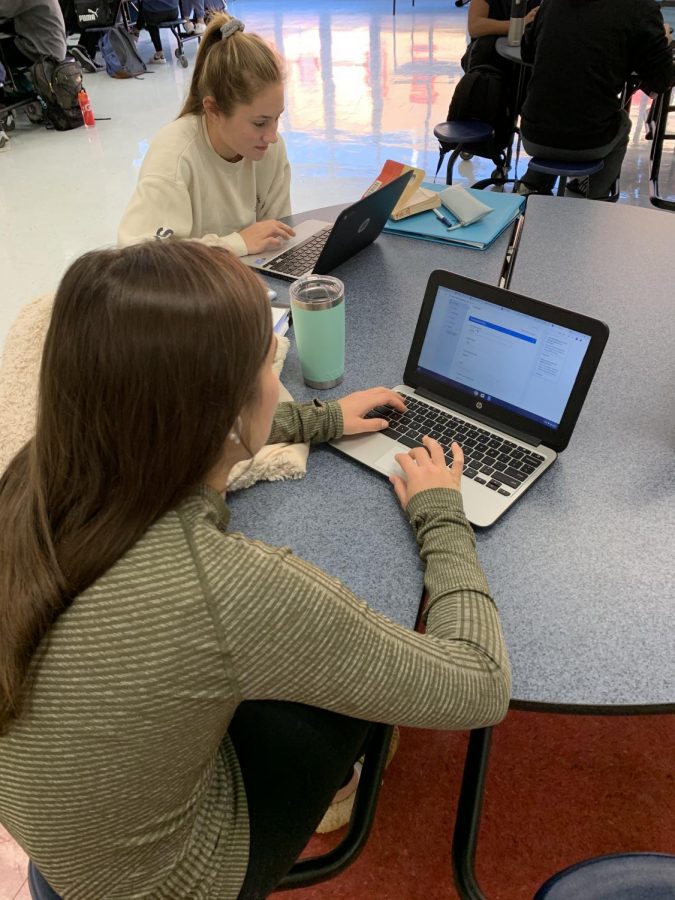Common Doesn’t Mean Easy
What Seniors Need to Know About Common App and Other College Preparatory Activities
Seniors Anna Lee Melton and Maxine Lynch working on their Common App. Photo courtesy of Kayla Jurzyk.
November 21, 2019
Ciara DeMott
Editor
Kayla Jurzyk
Staff Writer
As the month of November starts, high school seniors must prepare to apply to college.Seniors are rushing to complete their college applications. According to many students, preparing yourself for college can be overwhelming and stressful. However, there are many resources available to help with applying and gaining all the information needed to learn more about the process. Although this process can take time and work, here’s the breakdown to help achieve all college goals.
A primary resource to help this process is located directly in our school, in the college and career center with the help of Mrs. Wunder. She will go over any questions and as well as helping with your common app. Her best advice would be to, “Relax and take a deep breath, applying to college is not as complicated as you think. The school counseling department is here to help you every step of the way. Remember to stay on task and meet all deadlines.”She is available to help students with resumes, scholarships, job applications, and interviews, college applications and essays, community service questions, military and career visits and many other college and career opportunities. She will be available Mondays after school until 3:30 to help students with their college and career goals.
The Common app is an undergraduate college admission application that students may use to apply online to any member colleges and universities. For the 2019-2020 academic year, more than 740 colleges and universities will use and accept the Common App. This application makes it easier to apply to colleges and provides information on requirements and deadlines to meet. Senior Emily Wheaton says, “It makes me feel more organized and helps me get everything figured out, almost like a rough draft before I start the application process.”
This responsibility is for the student to rely on, not teachers or guidance counselors, however their guidance is helpful.
Naviance is a comprehensive solution which helps direct students to find their best interest and the colleges which provide the field of study in which they want to work in. In addition, you can request letters of recommendation to teachers or guidance counselors. Letters of recommendation will be sent by guidance, and the student has the responsibility to ask teachers and thanking them. English teacher, Ms. DePalma says, “In the letter of recommendation, I include how this student contributed in my class as a student, as well as a caring individual. The students who have come to me for recommendations are students who felt comfortable participating and my class and for whom I’ve built connections with through their learning.” It’s important to give the teacher a time to complete the letter. Provide them a list of your strengths in their class, or as an individual, important awards you have received is also good for a teacher to include in your recommendation.
The school counselors are also another resource located in school; guidance is in charge of high school transcripts including class courses and shows the student’s rank and grade point average which is sent directly to the colleges those students are applying to. School counselors are also in charge of sending letters of recommendation written by teachers, and at Foran the guidance department also writes a counselor recommendation that most schools don’t require but are happy to receive.
When applying to college, there are three different application deadlines. Early Decision, Early Action, or Regular Decision. Each application has its own advantages which will help everyone personally based on every situation. Early decision is binding, once accepted in December instead of April, the decision has already been made. Early Action is still an early application, but the decision is not required until the universal deadline of May 1. Regular Decision is normally taken around January and students will find out acceptance around spring break time. In general, it’s important to reach all deadlines and never miss an important date.
Although the college process seems alarming, there are many resources at Foran to help make the transition smooth for all students.







